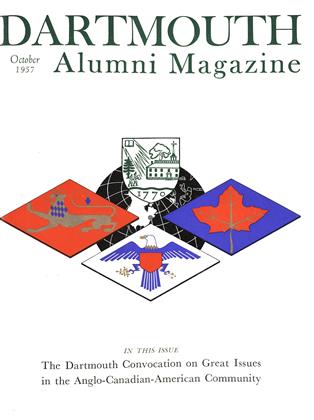SELECTIONS FROM THE ADDRESSES AND PANEL DISCUSSIONS OF THE CONVOCATION
September 3, 6 and 1, 1957
PRESIDENT OF DARTMOUTH COLLEGE we celebrate here the tenth anniversary of just one of many experiments made by institutions of higher learning during this past twelve-year period in an effort to be more responsive to the demands of postwar conditions. This is the tenth anniversary of an experiment launched at Dartmouth and subsequently borrowed in one form or another by scores of institutions as we in turn borrowed from them, the Great Issues Course. . . .
This convocation is not merely an anniversary of this undertaking, but in both form and theme is an avowal by Dartmouth that education neither begins nor ends with college, and that even on a campus education goes on outside the classroom. In form, we want each of you to carry on the panel discussions for yourselves at meals, on the campus, wherever two or more are gathered together. And if this happens, we will have no doubts about this convocation's having been worth while for you and for the Anglo-Canadian-American Community.
The theme of the convocation was chosen for many reasons, some historical, some geographic, but basically because we believe that there is nothing more important today than that the people of these three nations should talk to each other, as members of a community, about the issues that both divide and unite them. This talk should be responsible and candid, as befits the talk of men and women of good will discussing any community problem.
Our view of the nature of great issues is that they exist because a man has a choice, both as an individual and as a member of a group; that issues are great when the outcome matters greatly to an individual man; and that great issues almost always have a past. Manifestly they have a present form, and almost certainly they have a long future if they are great issues and if the answers which any one generation gives are only the answers of the moment, because at the core of any truly great issue are the moral dilemmas and values of human experience.
 View Full Issue
View Full Issue
More From This Issue
-
 Feature
FeatureFirst Panel Discussion
October 1957 By SIR GEOFFREY CROWTHER -
 Feature
FeatureOpening; Assembly
October 1957 By THE HONORABLE LEWIS W. DOUGLAS -
 Feature
FeatureFinal Assembly
October 1957 By THE HONORABLE JOHN GEORGE DIEFENBAKER -
 Feature
FeatureTHE DARTMOUTH CONVOCATION ON GREAT ISSUES IN THE . ANGLO – CANADIAN – AMERICAN COMMUNITY
October 1957 By GEORGE O'CONNELL -
 Feature
FeatureFirst Panel Discussion
October 1957 By CLARENCE B. RANDALL -
 Feature
FeatureHonorary Degree Ceremony
October 1957 By SIR WILLIAM HALEY
JOHN SLOAN DICKEY
Features
-
 Feature
Feature75 Years of Helping Students
APRIL 1971 -
 Feature
FeatureNine-Man Council Charts Course for Development
January 1954 By GEORGE H. COLTON '35 -
 Cover Story
Cover StoryIs "The College" a College?
December 1988 By James O. Freedman -
 Feature
FeatureFrom the Primate Patrimony To the Fellowship of Flowers
FEBRUARY 1970 By JAMES W. FERNANDEZ -
 FEATURES
FEATURES“We Are Your Only Hope”
MAY | JUNE 2023 By Jennifer Wulff ’96 -
 Cover Story
Cover StoryLiberating the Ph.D.
OCTOBER 1970 By Robert B. Graham ’40





